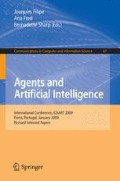Abstract
In this paper, we present a new machine learning algorithm, RL-SANE, which uses a combination of neuroevolution (NE) and traditional reinforcement learning (RL) techniques to improve learning performance. RL-SANE is an innovative combination of the neuroevolutionary algorithm NEAT[9] and the RL algorithm Sarsa(λ)[12]. It uses the special ability of NEAT to generate and train customized neural networks that provide a means for reducing the size of the state space through state aggregation. Reducing the size of the state space through aggregation enables Sarsa(λ) to be applied to much more difficult problems than standard tabular based approaches. Previous similar work in this area, such as in Whiteson and Stone [15] and Stanley and Miikkulainen [10], have shown positive results. This paper gives a brief overview of neuroevolutionary methods, introduces the RL-SANE algorithm, presents a comparative analysis of RL-SANE to other neuroevolutionary algorithms, and concludes with a discussion of enhancements that need to be made to RL-SANE.
Access this chapter
Tax calculation will be finalised at checkout
Purchases are for personal use only
Preview
Unable to display preview. Download preview PDF.
References
Boyan, J.A., Moore, A.W.: Generalization in reinforcement learning: Safely approximating the value function. In: Tesauro, G., Touretzky, D.S., Leen, T.K. (eds.) Advances in Neural Information Processing Systems, vol. 7, pp. 369–376. The MIT Press, Cambridge (1995)
Carreras, M., Ridao, P., Batlle, J., Nicosebici, T., Ursulovici, Z.: Learning reactive robot behaviors with neural-q learning. In: IEEE-TTTC International Conference on Automation, Quality and Testing, Robotics. IEEE, Los Alamitos (2002)
Gomez, F.J., Miikkulainen, R.: Solving non-markovian control tasks with neuro-evolution. In: IJCAI 1999: Proceedings of the Sixteenth International Joint Conference on Artificial Intelligence, pp. 1356–1361. Morgan Kaufmann Publishers Inc., San Francisco (1999)
James, D., Tucker, P.: A comparative analysis of simplification and complexification in the evolution of neural network topologies. In: Proceedings of the 2004 Conference on Genetic and Evolutionary Computation, GECCO 2004 (2004)
Moriarty, D.E., Miikkulainen, R.: Forming neural networks through efficient and adaptive coevolution. Evolutionary Computation 5, 373–399 (1997)
Rumelhart, D.E., Hinton, G.E., Williams, R.J.: Learning representations by back-propagating errors. Neurocomputing: foundations of research, 696–699 (1988)
Siebel, N.T., Krause, J., Sommer, G.: Efficient Learning of Neural Networks with Evolutionary Algorithms. In: Hamprecht, F.A., Schnörr, C., Jähne, B. (eds.) DAGM 2007. LNCS, vol. 4713, pp. 466–475. Springer, Heidelberg (2007)
Singh, S.P., Jaakkola, T., Jordan, M.I.: Reinforcement learning with soft state aggregation. In: Tesauro, G., Touretzky, D., Leen, T. (eds.) Advances in Neural Information Processing Systems, vol. 7, pp. 361–368. The MIT Press, Cambridge (1995)
Stanley, K.O.: Efficient evolution of neural networks through complexification. PhD thesis, The University of Texas at Austin. Supervisor-Risto P. Miikkulainen (2004)
Stanley, K.O., Miikkulainen, R.: Evolving neural networks through augmenting topologies. Tech. rep., University of Texas at Austin, Austin, TX, USA (2001)
Stanley, K.O., Miikkulainen, R.: Efficient reinforcement learning through evolving neural network topologies. In: GECCO 2002: Proceedings of the Genetic and Evolutionary Computation Conference, pp. 569–577. Morgan Kaufmann Publishers Inc., San Francisco (2002)
Sutton, R.S., Barto, A.G.: Reinforcement Learning: An Introduction (Adaptive Computation and Machine Learning). The MIT Press, Cambridge (1998)
Tesauro, G.: Temporal difference learning and td-gammon. Commun. ACM 38(3), 58–68 (1995)
Watkins, C.J.C.H., Dayan, P.: Q-learning. Machine Learning 8(3-4), 279–292 (1992)
Whiteson, S., Stone, P.: Evolutionary function approximation for reinforcement learning. Journal of Machine Learning Research 7, 877–917 (2006)
Author information
Authors and Affiliations
Editor information
Editors and Affiliations
Rights and permissions
Copyright information
© 2010 Springer-Verlag Berlin Heidelberg
About this paper
Cite this paper
Wright, R., Gemelli, N. (2010). Adaptive State Space Abstraction Using Neuroevolution. In: Filipe, J., Fred, A., Sharp, B. (eds) Agents and Artificial Intelligence. ICAART 2009. Communications in Computer and Information Science, vol 67. Springer, Berlin, Heidelberg. https://doi.org/10.1007/978-3-642-11819-7_7
Download citation
DOI: https://doi.org/10.1007/978-3-642-11819-7_7
Publisher Name: Springer, Berlin, Heidelberg
Print ISBN: 978-3-642-11818-0
Online ISBN: 978-3-642-11819-7
eBook Packages: Computer ScienceComputer Science (R0)

